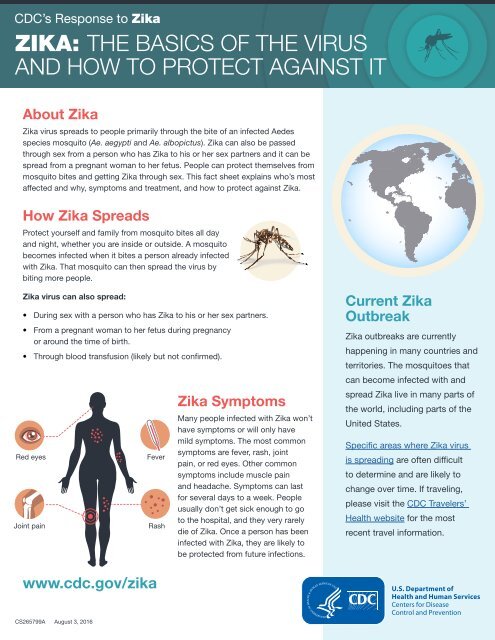fs-zika-basics
Create successful ePaper yourself
Turn your PDF publications into a flip-book with our unique Google optimized e-Paper software.
CDC’s Response to Zika<br />
ZIKA: THE BASICS OF THE VIRUS<br />
AND HOW TO PROTECT AGAINST IT<br />
About Zika<br />
Zika virus spreads to people primarily through the bite of an infected Aedes<br />
species mosquito (Ae. aegypti and Ae. albopictus). Zika can also be passed<br />
through sex from a person who has Zika to his or her sex partners and it can be<br />
spread from a pregnant woman to her fetus. People can protect themselves from<br />
mosquito bites and getting Zika through sex. This fact sheet explains who’s most<br />
affected and why, symptoms and treatment, and how to protect against Zika.<br />
How Zika Spreads<br />
Protect yourself and family from mosquito bites all day<br />
and night, whether you are inside or outside. A mosquito<br />
becomes infected when it bites a person already infected<br />
with Zika. That mosquito can then spread the virus by<br />
biting more people.<br />
Zika virus can also spread:<br />
• During sex with a person who has Zika to his or her sex partners.<br />
• From a pregnant woman to her fetus during pregnancy<br />
or around the time of birth.<br />
• Through blood transfusion (likely but not confirmed).<br />
Red eyes<br />
Joint pain<br />
Fever<br />
Rash<br />
Zika Symptoms<br />
Many people infected with Zika won’t<br />
have symptoms or will only have<br />
mild symptoms. The most common<br />
symptoms are fever, rash, joint<br />
pain, or red eyes. Other common<br />
symptoms include muscle pain<br />
and headache. Symptoms can last<br />
for several days to a week. People<br />
usually don’t get sick enough to go<br />
to the hospital, and they very rarely<br />
die of Zika. Once a person has been<br />
infected with Zika, they are likely to<br />
be protected from future infections.<br />
Current Zika<br />
Outbreak<br />
Zika outbreaks are currently<br />
happening in many countries and<br />
territories. The mosquitoes that<br />
can become infected with and<br />
spread Zika live in many parts of<br />
the world, including parts of the<br />
United States.<br />
Specific areas where Zika virus<br />
is spreading are often difficult<br />
to determine and are likely to<br />
change over time. If traveling,<br />
please visit the CDC Travelers’<br />
Health website for the most<br />
recent travel information.<br />
www.cdc.gov/<strong>zika</strong><br />
CS265799A<br />
August 3, 2016
CDC’s Response to Zika<br />
Why Zika is Risky for Some People<br />
Zika infection during pregnancy can cause fetuses to have a birth defect of the brain<br />
called microcephaly. Other problems have been detected among fetuses and infants<br />
infected with Zika virus before birth, such as defects of the eye, hearing deficits, and<br />
impaired growth. There have also been increased reports of Guillain-Barré syndrome,<br />
an uncommon sickness of the nervous system, in areas affected by Zika.<br />
How to Prevent Zika<br />
Microcephaly<br />
There is no vaccine to prevent Zika. The best way to prevent diseases spread by<br />
mosquitoes is to protect yourself and your family from mosquito bites. Here’s how:<br />
• Wear long-sleeved shirts and long pants.<br />
• Stay in places with air conditioning and window and door screens to keep<br />
mosquitoes outside.<br />
• Take steps to control mosquitoes inside and outside your home.<br />
• Treat your clothing and gear with permethrin or buy pre-treated items.<br />
• Use Environmental Protection Agency (EPA)-registered insect repellents. Always<br />
follow the product label instructions.<br />
• When used as directed, these insect repellents are proven safe and effective<br />
even for pregnant and breastfeeding women.<br />
• Do not use insect repellents on babies younger than 2 months old.<br />
• Do not use products containing oil of lemon eucalyptus or para-menthane-diol<br />
on children younger than 3 years old.<br />
• Mosquito netting can be used to cover babies younger than 2 months old in<br />
carriers, strollers, or cribs to protect them from mosquito bites.<br />
• Sleep under a mosquito bed net if air conditioned or screened rooms are not<br />
available or if sleeping outdoors.<br />
• Prevent sexual transmission of Zika by using condoms or not having sex.<br />
What to do if You Have Zika<br />
There is no specific medicine to treat Zika. Treat the symptoms:<br />
• Get plenty of rest.<br />
• Drink fluids to prevent dehydration.<br />
• Take medicine such as acetaminophen to reduce fever and pain.<br />
• Do not take aspirin or other non-steroidal anti-inflammatory drugs.<br />
• If you are taking medicine for another medical condition, talk to<br />
your healthcare provider before taking additional medication.<br />
To help prevent others from getting sick, strictly follow steps to<br />
prevent mosquito bites during the first week of illness.<br />
Repellent<br />
www.cdc.gov/<strong>zika</strong>



